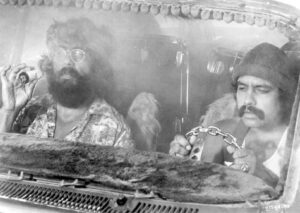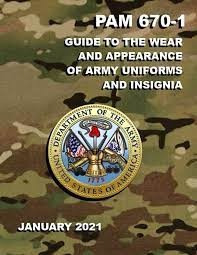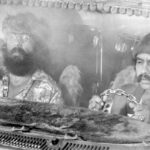We were taught early on to accept our mistakes and learn from them. It’s not easy when you’re a little kid, but later you find it has its own reward as you build character inside the clutter-accumulating box of your life.
The counterculture revolution of the 60’s and 70’s was slow in coming to my pigpen, probably because I was thoroughly regimented in military high school at the time and had subscribed dutifully to the military-industrial complex.
It may interest you to know, the term military-industrial complex was coined as part of a cautionary highlight by Dwight D. Eisenhower in his Farewell Address to the nation upon leaving the Presidency on January 17, 1961. In what sounds like something that could easily be said today – excepting the phrase itself has fallen out of favor, despite the fact it is more alive than ever – he warned:
“In the councils of government, we must guard against the acquisition of unwarranted influence, whether sought or unsought, by the military–industrial complex. The potential for the disastrous rise of misplaced power exists and will persist.”
This from a man whose entire adult life – and the opportunities it presented, including two terms in the Presidency itself – was shaped in the military-industrial mold. Eisenhower was a 1915 graduate of West Point in the famous “The Class the stars fell upon” because over a third of that year’s graduates went on to become high ranking officers in the armed forces. After graduation he became a career Army officer and, of course, the famous supreme leader of Allied forces in the later part of WWII.
It’s a curious fact – but no surprise – that West Point has a partnership with my alma mater – St John’s College High School in Washington, DC. Curious because the school is owned and run by the Christian Brothers. Is it just me, or is there something strange about having a military school owned and run by an order of religious faith? I mean – doesn’t it bring to mind some questions? Like: What the hell? One must wonder how it is they reconcile a Love thy neighbor “Christian philosophy” with teaching us creative ways to kill them in hand-to-hand combat. But, then again, there were the Crusades…. It seems the Christian Brothers were not shy about cashing in on the munificence of the US war machine, their ecclesiastic vows notwithstanding. The Christian Military-Industrial Complex is apparently thriving.
Here’s where I insert a little digression about the name – St John’s College High School – which has always bugged the hell out of me. It’s not a misspelling. So, what exactly is a COLLEGE high school? Is it different than all other high schools? Somehow superior because others obviously are not serious about college? The impression is; you go to other high schools to drop out, while at St John’s you attend because you WILL be going to college or God will damn your soul. I never figured it out. Probably don’t need to.
 Then came Sex and Drugs and Rock & Roll. Try as they mightily did to keep us away from it all, the Christian Brothers could not hold back the cultural tide. There were already a few chinks in the armor, so to speak, – ones that would eventually widen into a complete breach of the fortress walls – so it came as no surprise to me and my fellow Cadets when the THC-infused smoke came wafting in from, of all places, our HiFi stereo
Then came Sex and Drugs and Rock & Roll. Try as they mightily did to keep us away from it all, the Christian Brothers could not hold back the cultural tide. There were already a few chinks in the armor, so to speak, – ones that would eventually widen into a complete breach of the fortress walls – so it came as no surprise to me and my fellow Cadets when the THC-infused smoke came wafting in from, of all places, our HiFi stereo
Despite the strict rigidity of militarized religion (or religious military, or whatever you want to call it), into the St John’s citadel – high as kites – floated Cheech and Chong, the dynamic duo of hallucinogenic comedy. In 1971 their self-titled debut album took the world by drug-infused storm. And once the Cadets started toking, there was no going back.
I was never much of a pothead. The school dealer was frustrated because I never bought anything from him. My friends, too, had the same laisse faire attitude toward hooch and other illicit drugs. We smoked pot on occasion – at parties, or in the parking lot after bowling – yet for us it seemed more of an act of rebellion than an earnest intent to get stoned. But I must admit there were times I went overboard, like when I tried to impress my girlfriend, Maria. She was from Costa Rica and was a much heartier partier than I. Being the idiot I was in those days (as opposed to the idiot I am today), I went out of my way to prove her equal in the pot smoking department and, predictably, made a total stoned ass out of myself on occasion.
One evening we were riding in the back seat of Paul’s car on our way to a KISS concert at the Capitol Center (what a rat hole that place was – glad it got bulldozed in 2002). Maria and I had smoked a few joints and were feeling pretty good. As Matt had picked me up just after school, I was still wearing my military dress blues which were notoriously hot in summertime. I was in the process of changing into a pair of jeans while bitching about our military apparel, when Maria, in a fit of stoned playfulness, grabbed my uniform paints, rolled down the window said “Since you don’t like these, let’s just toss them out…”
What I should have done – and would have, if I wasn’t supremely stoned – was said nothing and ignored her. She would maybe have pouted a little when no one cared about her joke and that would have been about it. But I wasn’t sober and those pants cost a fortune. I had only two pair and one was at the tailor. I needed this pair the very next morning.
As you probably already guessed, I didn’t do what I should have done and got pissed instead. I lunged for the pants as Maria, giggling uncontrollably as only a stoned schoolgirl can, stuck her arm out the window, my pants with it, flying like a flag at 60 mph. The ensuing pot-laden backseat ruckus lasted only a short while, as I finally got ahold of Maria’s arm. But in doing so I sealed my fate. She said later that she had not intended what then ensued – and, to this day, I believe her – but my clasp on her forearm weakened her grip on my pants and they sailed away into the Capitol Beltway rush-hour traffic.
Thus, early the next morning I was forced to borrow a pair of pants. But the only person who actually had a pair available was my friend Paul. The good news was we had the same waist size. The not so good news was Paul was about 8” shorter than me. I had no choice but when I put my toes on the line for Inspection, I looked like a basketball player in elf’s clothing.
As anyone who has been through the military can tell you, Basic Training is all about “following the book.” There is, literally, a training manual (TM), field manual (FM), education manual (EM), or pamphlet for everything in the military: Map Reading? That’s FM 3-25. Sanitation? Covered in FM 21-10. There’s also Wheeled Vehicle Driver (TM 21-305), Boobytraps (FM 5-31), and everything else you can think of. There’s even one called Building Good Sentences (EM 102) which I should probably read. Or maybe not…
 There were two manuals that ruled our life at St John’s: Pamphlet 670–1 Guide to the Wear and Appearance of Army Uniforms and Insignia, and FM 22-5 – Drill and Ceremonies. In 670-1 was the prescription for how we were supposed to dress. Specifically – in relation to my case here – if you were wearing pants, it dictated how:
There were two manuals that ruled our life at St John’s: Pamphlet 670–1 Guide to the Wear and Appearance of Army Uniforms and Insignia, and FM 22-5 – Drill and Ceremonies. In 670-1 was the prescription for how we were supposed to dress. Specifically – in relation to my case here – if you were wearing pants, it dictated how:
11-8 Trousers, blue
- How worn.
The back hem of the trousers should fall approximately midway between the top of the heel and the top of the standard shoe in the back. The bottom of the front crease of the trousers should reach the top of the instep. The trousers may have a slight break in the front. The trousers should be full enough around the hips to prevent …
While the wording was clear about where the pants hem should land, in the mid 1970s the instructions were not as precise about the location of the belt, probably because, at that time, any sane person would wear their belt around their waist, not halfway down their buttocks like some clowns do today. (Footnote: As a result of the “low rider” 1990s trends in Hip-Hop style, 670-1 was updated to prescribe EXACTLY where your pants beltline AND belt should appear on your body).
I did not appear particularly sane at this point – 6:45am – and it was obvious to anyone who looked. Presently the Fall-in! order was given and we formed up, standing at rigid attention in the hall. Shortly thereafter the exact person whom I didn’t want to notice me came along, slowly and methodically marching past us while inspecting cadets along the line. When he got to me, he stopped– not a good sign, I assure you – and, with a crisp click of his heels, snapped left to face me directly, about two inches from my nose. There followed an uncomfortable silence which always precludes a special, official, haranguing. Finally, with the contemptible sneer of a true Master Sargent, he yelled into my face:
Corporal Kramer! What the hell is with your pants?
Those are not my pants, Sir! That was possibly the stupidest thing I could have said, but sometimes the little kid in us takes over and we blurt out exactly what we shouldn’t! This caused an uproar as all the surrounding cadets laughed out loud, something you definitely do not want to happen because the Inspecting Officer will, rightfully, blame you for this disturbance blemishing his watch.
Oh, really. Whose pants are they?
PFC Finkelstein’s, Sir.
And why are you wearing PFC Finkelstein’s pants, Corporal Kramer?
I would have told him the story, but the little kid was finally overpowered by the dumb-ass cadet. Besides, it would not have made a shred of difference. In fact, it would have worked against me because he couldn’t care less about my pathetic alibi. In the military you learn there really is no good reason for your screw up, excepting your own ineptitude.
And there lies one of the most important lessons I learned in the military: Hold yourself accountable for your actions. You do not bullshit an officer – or even a fellow cadet – when he/she asks you a question about some fuckup you were involved in. All these years later – through my entire adult life – the trait I value most in friends, climbing partners, and employees is personal accountability. When a person starts making up excuses for some misstep or total SNAFU, that’s when I lose all respect for them. On the other hand, if they own up to it and learn from it, then that’s all one can ask for. As the saying goes, we’re all human. But never forget the Karma!
There’s a very useful phrase every new recruit learns early on, which is exactly what I should have said in the beginning of my interrogation, before the little kid hijacked my brain. Now I said to the officer shouting in my face:
Sir! No excuse, Sir!
I ended up with two demerits – one for ‘out of uniform’ (the pants), one for ‘insubordination’ (the laughing). But it could have been worse.
Between classes and puffs on the joint, Cheech & Chong was almost all we talked about. In case you are unaware of their comedy, one of their particularly timeless skits is the iconic “Dave” routine. It still withstands the test of time, probably because it does a great job of encapsulating the stoner approach – then and now – to certain everyday situations.
The scene starts with Cheech, knocking softly on a back door. In a paranoid conspiratorial tone, he whispers: Hey man, open up, I got the stuff…
No answer, so he knocks again, a little harder.
Who is it? comes a voice from inside (Chong).
It’s me – Dave – I got the stuff. Open up…
Who?, asks the stoner.
Dave! I got the stuff man, open up…
Dave? Chong replies, obviously wasted, Dave?
Yes, Dave! It’s me, open up! I think the cops saw me come in here….
Dave’s not here! It devolves from there.
Then came their first feature film Up In Smoke, a 1978 low-budget enterprise that launched the “Stoner Film” genre. By the time it hit the Big Screen, my own transformation was complete. I did a total about-face from my high school days and became a bona fide Hippy skateboarding to classes at the University of Maryland and working in the Food Coop. I wore a Mexican Sarape and Indian Beggar Beads while protesting the military-industrial complex and its expansion of the nuclear arsenal. It wasn’t because of Cheech & Chong, and certainly wasn’t because of the small amount of pot I smoked. It was just my own natural evolution: I was entering the next phase of my life’s exploration.
Because of the obvious illicit pot-smoking plot of Up In Smoke (after release, it was banned in several countries) few movie houses even considered the screenplay, despite the fact Cheech and Chong were a very saleable commodity by this time. Eventually, however, Paramount Pictures pitched in $1 million for the filming.
But when studio president, Michael Eisner, saw the rough cut, he freaked out and flatly refused the additional $800,000 needed to complete the editing. So, Lou Adler, the director, used his own money to buy the unfinished product and complete it. When the finished film was screened later, it hit a chord with a large swath of the American public. Chong said, “People were going crazy,”. As it turned out, Eisner was one of them. He had gone to one of the screenings and witnessed first-hand the euphoria of the audience. Right then he knew he’d made a huge mistake. He called Adler and set up a meeting.
“When I met Eisner, he had that look like he had fucked up bigtime,” Chong said.
A new deal was cut. Paramount ended up sheepishly buying back the film and releasing it nationwide. The final cost came in at around $2 million, a pretty low figure considering the typical cost for a feature film at that time was over $5 million.
Up In Smoke became a smashing success and has been a cult classic ever since. Even prior to its official release date, the film was making money in trial runs. By the end of the first month of full release, it had grossed over $20 million. Eventually it went on to gross $76 million at the domestic box office and over $104 million worldwide. If you consider that the studio captures about 60% of the box office receipts, then Up In Smoke brought in over $60 million for Paramount.
While he may have screwed up big-time in originally refusing to finish the film, by taking responsibility for his stupidity, Michael Eisner ultimately owned up to it and saved himself – and Paramount – both embarrassment and the loss of a huge hit. Buying it back paid off handsomely. Most people would agree that it was worth the 3,000% return on eating crow.

